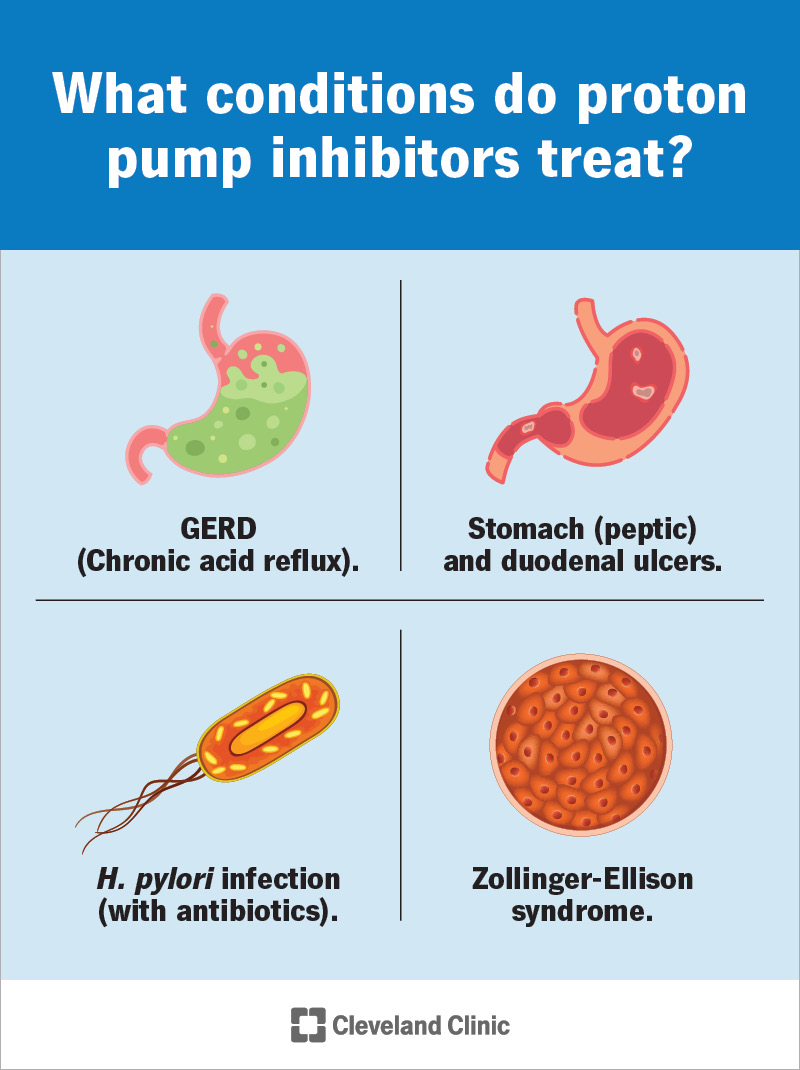Proton pump inhibitors (PPIs) are a group of medicines that decrease stomach acid production. They can help relieve symptoms of chronic acid reflux (GERD) and stomach ulcers. PPIs are available both over the counter and by prescription. Brands include Nexium, Prevacid and Prilosec.
Advertisement
Cleveland Clinic is a non-profit academic medical center. Advertising on our site helps support our mission. We do not endorse non-Cleveland Clinic products or services. Policy

Image content: This image is available to view online.
View image online (https://my.clevelandclinic.org/-/scassets/images/org/health/articles/proton-pump-inhibitors)
Proton pump inhibitors are a class of drugs that reduce how much acid your stomach makes. Stomach acid serves an important purpose. It breaks down food so you can digest it. Stomach acid also kills harmful germs in your gut that may make you sick.
Advertisement
Cleveland Clinic is a non-profit academic medical center. Advertising on our site helps support our mission. We do not endorse non-Cleveland Clinic products or services. Policy
Too much stomach acid or stomach acid in the wrong place can cause problems, though, like stomach ulcers or acid reflux. PPIs treat these issues and others. You should use them if you have long-term issues related to excess stomach acid.
Proton pump inhibitors primarily treat conditions that arise when stomach acid irritates or damages parts of your digestive system, like your stomach, duodenum (the part of your small intestine closest to your stomach) or your food tube (esophagus). PPIs are used to treat:
Advertisement
Proton pump inhibitors block an enzyme that produces stomach acid. It’s called the hydrogen-potassium ATPase pump, or the “proton pump,” for short. Think of it this way: proton pump inhibitors “inhibit” (or prevent) the proton pump from completing the chemical processes needed to make stomach acid.
PPIs don’t stop the production of all stomach acid. You’ll still have enough to digest food. If you were to take a PPI daily for about five days, the drugs would reduce about 65% of your stomach acid. You’d still have the remaining 35% for your stomach to break down food.
PPIs are available over the counter (OTC) or with a prescription (Rx), depending on the brand.
You take them by mouth, as either a capsule or tablet. With some brands, you can mix the powder inside the capsule with foods like applesauce. This can help if you have trouble swallowing pills.
Read the instructions on the package carefully before you take them so you know how to get the most benefits from taking them. Depending on the brand, you may need to take them on an empty stomach, 30 minutes to an hour before eating. Getting the timing right gives the medicine time to work before your stomach produces acid in response to food.
Talk to a healthcare provider to determine how strong of a dose you need and how often you need to take PPIs. They can recommend a dose strong enough to help you without putting you at risk of side effects.
Some people only need one pill before breakfast. Others take two pills a day, usually one before breakfast and one before dinner. You may be fine with taking PPIs every other day.
Eventually, you may need to reduce your dosage. A healthcare provider can advise you on this.
It may take 24 hours to four days to notice the full benefits of taking PPIs.
If your symptoms are unexpected and need quick relief, try an antacid or a histamine blocker (H2), like Pepcid® or Tagamet®, instead. For example, if you ate a spicy meal and suddenly have heartburn, you may be better off reaching for these options first. They help provide relief within minutes or hours instead of days. But their benefits wear off more quickly than PPIs.
PPIs are considered the better option if you have chronic (long-lasting) issues with stomach acid production.
Most people who take PPIs don’t experience issues. As with any medication, there are potential side effects, including:
Advertisement
Although PPIs are generally considered safe, researchers have identified potential risks associated with them, especially when using them long-term. PPIs may increase your risk of:
More research is needed to understand the connection between PPIs and potential risks. In the meantime, providers usually recommend you take the PPI dosage in the shortest time frame possible to improve your symptoms without increasing your risk of potential side effects.
If you have a PPI prescription, contact your provider with questions about taking them, including when it’s safe to stop or taper your medication.
Advertisement
Contact your healthcare provider if you take over-the-counter PPIs and find you need them daily to control symptoms. They can advise you on how strong a dosage you need and how often you should take them.
You should also contact your provider if you notice concerning side effects, including:
Too much stomach acid — or stomach acid in the wrong place — can be painful and damage your digestive system. A variety of medications are available that can help if you’re experiencing symptoms related to excess or out-of-place stomach acid.
For short-term relief, your best bet may be an antacid or an H2 blocker. If you have frequent heartburn or a stomach ulcer, your healthcare provider may recommend a PPI instead. They’ve been around for years and are considered safe and effective treatments. Many people rely on them for relief.
Advertisement

Sign up for our Health Essentials emails for expert guidance on nutrition, fitness, sleep, skin care and more.
Learn more about the Health Library and our editorial process.
Cleveland Clinic’s health articles are based on evidence-backed information and review by medical professionals to ensure accuracy, reliability and up-to-date clinical standards.
Cleveland Clinic’s health articles are based on evidence-backed information and review by medical professionals to ensure accuracy, reliability and up-to-date clinical standards.
If you have issues with your digestive system, you need a team of experts you can trust. Our gastroenterology specialists at Cleveland Clinic can help.
